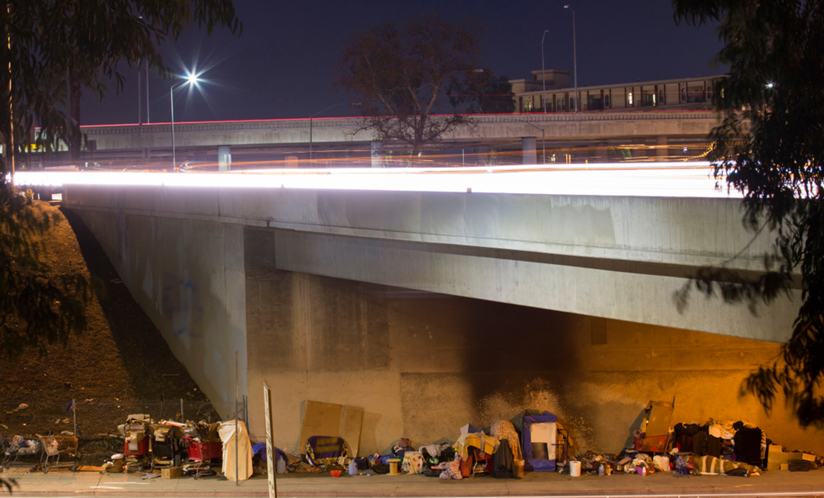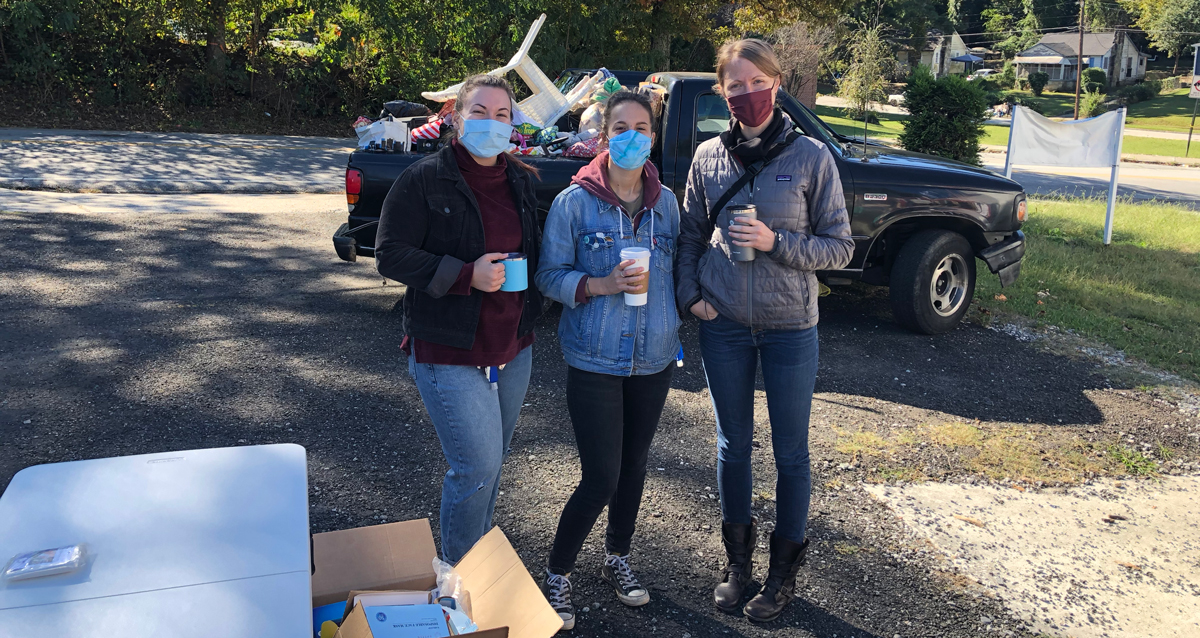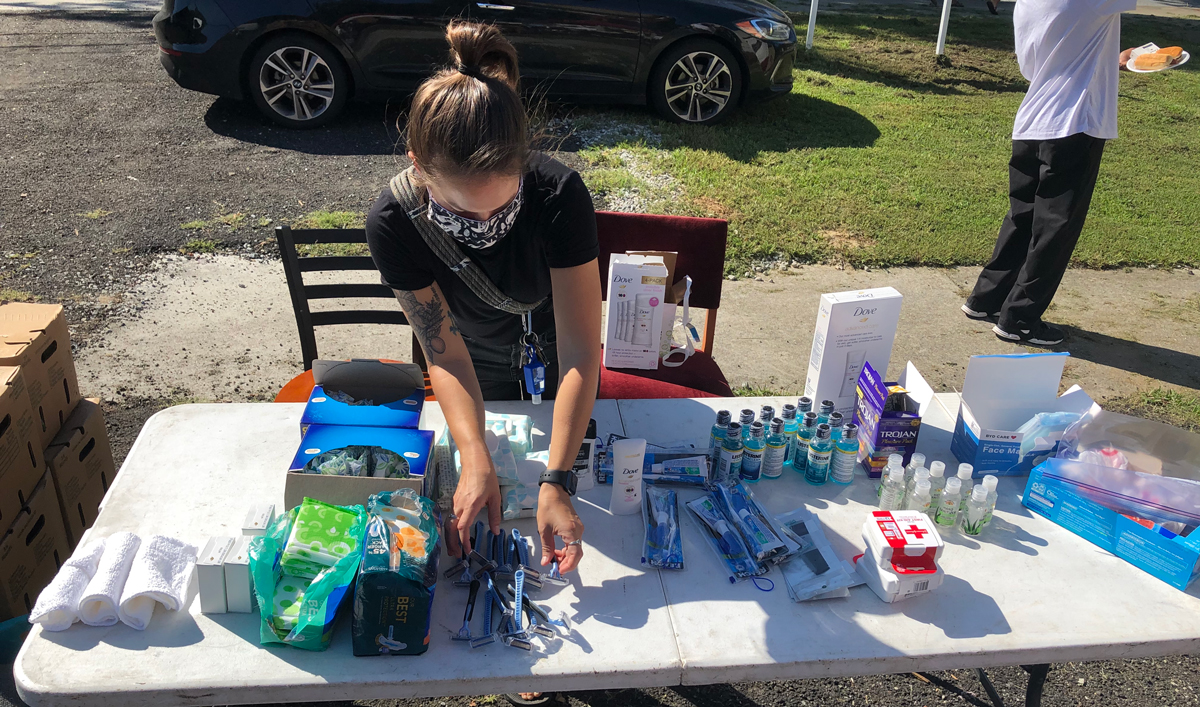Dignity Pack Project Provides Hundreds of Hygiene Kits to Atlanta’s Homeless

By Karina Antenucci
The Dignity Pack Project supplies people experiencing homelessness in Atlanta, Georgia with basic hygiene supplies, period supplies, condoms, and PPE. The project, which began in August 2020, has provided approximately 500 “Dignity Packs” to a population with increasing needs during COVID in a short period of time. The Dignity Pack Project was conceptualized and is run by three Rollins students: Alison Hoover, second-year MPH student in the Hubert Department of Global Health; Environmental Health Sciences PhD candidate April Ballard; and second-year Gangarosa Department of Environmental Health MPH student Ana Rodriguez.

Hoover was recognized by the Bill & Melinda Gates Institute and Bayer in the fall of 2019 as a “120 Under 40: The New Generation of Family Planning Leader.” Because of this recognition, she was eligible to apply for funding from the Gates Institute for Population & Reproductive Health and Bayer to carry out a project on population and reproductive health. The Dignity Pack Project is supported by its 2020 Ingenuity Fund.
Having received the funding in July 2020, Ballard, Hoover, and Rodriguez immediately got to work on this project that they had been brainstorming on and speaking about since the fall prior. “We had some of the bones in place before the grant came up,” says Ballard.
The students use the grant money to buy supplies in bulk from Costco, Target, and Amazon. Donations have also come from local organizations, such as Atlanta Track Club, which donated drawstring bags for the homeless community to pack with products, and Homeless Period Project Atlanta, which has given many period supplies. Additionally, they have received cash donations via Venmo and items from an Amazon wish list from colleagues, friends, and family. Hoover’s apartment serves as an unofficial warehouse.
“Supplies have been adjusted over time to adapt to the shifting realities of the COVID-19 pandemic, and more importantly, based on systematically collected feedback from those experiencing homelessness,”explains Hoover.

Ballard adds, “Organizations are doing their best but can only do so much with the funds they have. They just don’t have money for a lot of these supplies and people need things. We like to bring name-brand products instead of mediocre ones. When people see we have Dove soap, they say, “Ooh you’ve got the good stuff!”
Distribution typically happens at places where partner organizations such as SafeHouse Outreach are serving food to Atlanta’s homeless. The Dignity Pack Project team sets up a table where people can “shop” for the type and number of items they want. Product kits are not pre-packaged so that they can select items depending on their preferences and needs. “This presents a humanist, rights-based approach to harm-reduction efforts among people experiencing homelessness,” Hoover says.
Rodriguez notes, “People experiencing homelessness have rights and autonomy, and need things we take for granted like protection from infectious disease. I think this project is important because in all my time doing science, there’s never been a conversation around listening to the ‘target population.’ This project recognizes these people as humans, which is so often not the case. We are listening to voices that are usually 99% disregarded. It has been an incredibly insightful experience starting out in this field [of public health].”
“Decentering ourselves from the program and research process has been an enormous gift. This work has been so much fun. These are joyous occasions with goofy banter exchanges with partners and people who come by,” Hoover says of time out in the community.
Recognizing this great work, the Dignity Pack Project recently won a 2021 Martin Luther King, Jr. Community Service Award. The award honors the legacy of Dr. King and the mission and values of public health with the precepts of social justice.
Hoover says, “When we talk about our responsibility as public health practitioners, this is an example of where a basic survival need and the human right to exist is not being met. It feels ignored, important, and urgent. The Dignity Pack Project is harm-reduction focused; it is recognizing that people have basic needs for their survival and dignity and just focuses on that.”
In the long-term, the team hopes for more funding for organizations and entities that are trying to support those experiencing homeless, as well as institutional-supportive policies and funding for people to stay fed, warm, and clean when they please. Hoover explains that there is no shortage of people in the community who understand the issue at hand and want to help folks experiencing homeless, but there’s a disconnect between that willingness and the access points to groups already doing the work that needs figuring out. In the meantime, the Dignity Pack Project will continue its boots-on-the-ground efforts as long as it has the resources to do so.
“It’s been beautiful to see people in Atlanta welcome us. There’s a lot of rightful mistrust in communities that are low income and the ones hit the hardest by the COVID-19 pandemic, so I think one of the best things about the project has been the community’s willingness to invite us in as if we are their next-door neighbors,” Ballard says.
If interested in getting involved or donating, contact Alison Hoover at alison.hoover@emory.edu or visit the Amazon wish list.


